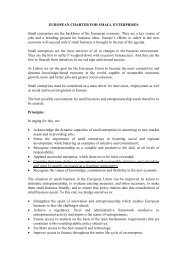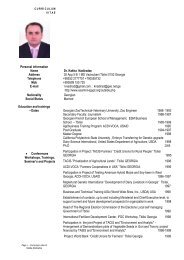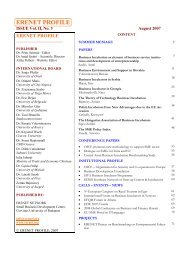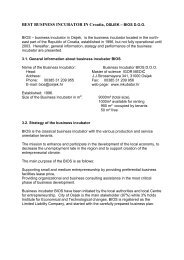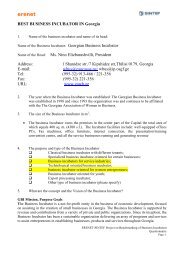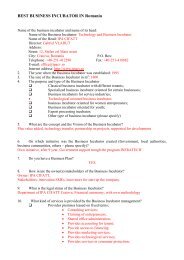Strategies of the Development of Entrepreneurship and SME
Strategies of the Development of Entrepreneurship and SME
Strategies of the Development of Entrepreneurship and SME
You also want an ePaper? Increase the reach of your titles
YUMPU automatically turns print PDFs into web optimized ePapers that Google loves.
6. DELICACY ON THE ENTREPRENEURSHIP AND <strong>SME</strong> DEVELOPMENT INTHE EXIS OF ANKARA-ATHENS 436.1. GREECE, THE OLDEST EU COUNTRYDuring <strong>the</strong> 50s <strong>and</strong> 60s, growth in Greece was based on <strong>the</strong> development <strong>of</strong> a significantrange <strong>of</strong> heavy industrial activities as well as on <strong>the</strong> flourishing <strong>of</strong> a spectrum <strong>of</strong> industries thatcomposed <strong>the</strong> traditional basis <strong>of</strong> <strong>the</strong> Greek industry (textile, food, <strong>and</strong> beverages). Later, Greekeconomy faced several crises as it fell behind European member states in terms <strong>of</strong> productivity<strong>and</strong> competitiveness. Throughout <strong>the</strong> 80s <strong>and</strong> 90s, labor productivity growth in <strong>the</strong> businesssector deteriorated <strong>and</strong> growth rate in manufacturing was at a slower pace than that in <strong>the</strong>economy-wide level. The basic element <strong>of</strong> <strong>the</strong> transformation in <strong>the</strong> Greek industry has beentechnology transfer via import <strong>of</strong> capital equipment, foreign direct investment, <strong>and</strong> licensing.Technology transfer was considered one <strong>of</strong> <strong>the</strong> main tools to improve competitiveness <strong>of</strong> Greekfirms, especially during a period <strong>of</strong> globalization <strong>of</strong> competition, <strong>of</strong> integration into <strong>the</strong> EuropeanCommunity (Union) <strong>and</strong> trade liberalization. Low export intensity <strong>of</strong> recipient firms, <strong>the</strong> weakperformance <strong>of</strong> Greek manufacturing, <strong>and</strong> <strong>the</strong> increasing deterioration <strong>of</strong> <strong>the</strong> competitive position<strong>of</strong> Greece in technologically advanced activities, raise serious questions about <strong>the</strong> extent to whichGreek firms succeeded to exploit technology transfer in order to upgrade <strong>the</strong>ir technological <strong>and</strong>organizational capabilities (Giannitsis, 1991). The main concern <strong>of</strong> Greek industrial policy during<strong>the</strong> last 20 years has been to deal with <strong>the</strong> problems occurred as a result <strong>of</strong> globalization, <strong>and</strong> toestablish a new framework <strong>of</strong> policy intervention within <strong>the</strong> context <strong>of</strong> <strong>the</strong> European Union. Inaccord with this framework, <strong>SME</strong>s are accepted as <strong>the</strong> heart <strong>of</strong> government policies on businessenvironment. The role <strong>of</strong> <strong>SME</strong>s in Greece economy can be summarized as follows:• Number <strong>of</strong> <strong>SME</strong>s in Greece exceeds 733,000.• 99,55% <strong>of</strong> <strong>the</strong> total number <strong>of</strong> enterprises employ 50 persons <strong>and</strong> below• The number <strong>of</strong> <strong>SME</strong>s with 1-9 salaried workers is 321,000, making up 43.8% <strong>of</strong> <strong>the</strong>total amount, with 508,000 salaried workers or average employment <strong>of</strong> 1.6%.• 2.2% employ from 10 to 49 salaried workers (<strong>the</strong> majority <strong>of</strong> <strong>the</strong> enterprises in thiscategory employs less than 20 people) or 2.2% employ a total amount <strong>of</strong> 303,000workers with average employment <strong>of</strong> 18.8%• The number <strong>of</strong> <strong>SME</strong>s with 50 to 249 salaried workers are up to 2,200 or 0.3%, with <strong>the</strong>average employment <strong>of</strong> 100.9• 53.7% do not employ any salaried workers <strong>and</strong> employ 11 people on average, where<strong>the</strong>ir family members work• These enterprises employ 74% <strong>of</strong> <strong>the</strong> work force <strong>of</strong> <strong>the</strong> private sector• <strong>SME</strong>s provide 70% <strong>of</strong> <strong>the</strong> new jobs, reinforce <strong>the</strong> regional development <strong>and</strong> financialbalance <strong>of</strong> <strong>the</strong> regions <strong>and</strong> contribute to <strong>the</strong> cohesion <strong>of</strong> financial <strong>and</strong> social link in Greeksociety• Big enterprises with over 250 employees cover only <strong>the</strong> 13.5% <strong>of</strong> employments with230,000 salaried <strong>and</strong> in total, <strong>SME</strong>s employ 1,695,000 people, from which 712,000 onaverage are salaried.• Proportion <strong>of</strong> <strong>the</strong> employment in <strong>SME</strong>s to that in <strong>the</strong> big enterprises is 87.5% to 13.5%<strong>and</strong> as far as salaried work is concerned, 75% to 25% or 3 to 1In o<strong>the</strong>r words, “micro-enterprises with 0-9 employees <strong>and</strong> in total 943,000employees, self-employed or salaried, cover <strong>the</strong> 55.6% <strong>of</strong> employment, small enterprises with10-49 employees cover <strong>the</strong> 18% <strong>of</strong> <strong>the</strong> employment with 303,000 people, from which 287,00043 Prepared by Dr. Dilek CETINDAMAR, Associated Pr<strong>of</strong>essor, Graduate School <strong>of</strong> Management, Sabanci University,Istanbul <strong>and</strong> Umut Yƒlmaz ÇETINKAYA, Ph.D. Student at <strong>the</strong> Graduate School <strong>of</strong> Social Sciences at <strong>the</strong> METUAnkara, Project Assistant at TUBITAK-STPS-TEKNOKENT119



